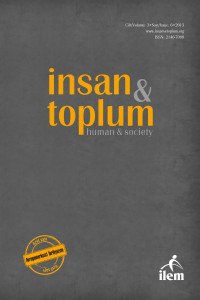Abstract
Tarihyazımına ve tarihiliğe “kendi-merkez” ağırlıklı ve “çokkültürlülük” yaklaşımları ile katılan Çağdaş söylemlerin incelenmesine dayalı bu çalışma, Avrupamerkezci ideolojilerin yaygınlaşmasına karşı Amerikan Akademisinde 1980’lerde güçlü bir alternatif geliştiren Afrikamerkezci felsefenin doğuşunu ve getirdiği önemli evreleri analiz etmeyi amaçlamaktadır. Avrupamerkezci üşünce ve Batılı etimolojilerin savunduğu evrensellik ve tarihte öngelinilirlik iddialarının çürütülmesi onusunda Afrosentrik (Afrocenticity) felsefe insanlık ve medeniyet tarihinin başlangıcınadir farklı bir bakış açısı sunmayı hedefler. Birleşik Devletlerde İnsan Hak ve Hürriyetleri hareketi sonrası ortaya çıkan Siyah Güç ve Siyah Sanatlar Hareketlerinin bir sonucu olarak üniversitelerde Siyah Etütleri departmanları ve programları kurulmuş, böylece Afrosentrik düşünce özgürce tartışılmaya başlanmıştır. Bu düşünce şekli 11 Eylül 2001 sonrasında Orta Doğu, Kuzey Afrika,Asya ve Uzak Doğu ekseninin Batı’ya karşı güçlenmesinde özellikle etkili olurken tüm dünyada yaygınlaşan çatışma karşıtı söylemlerin kabul görmesini ve insan haklarının ivedilikle savunulması yolunda kültürel farklılık düşüncesine öncelik verilmesini sağlamıştır.
Keywords
Çokkültürlülük Afrikamerkezci Avrupamerkezci Tarihyazımı Michel Foucault Afrika-Amerika Söylemi
References
- Anadolu-Okur, N. (1995). Ma’at, Afrocentricity and the critique of African American drama. In D. Zeigler (Ed.), Molefi Kete Asante and Afrocentricity, in praise and criticism (pp. 139-151). Nashville, TN: James C. Winston.
- Anadolu-Okur, N. (1997). Contemporary African American theater: Afrocentricity in the works of Larry Neal, Amiri
- Baraka, and Charles Fuller. New York, & London: Garland Publishing.
- Ani, M. (1988). Let the circle be unbroken: The implications of African spirituality in the diaspora. New York, NY: Nkonimfo.
- Ani, M. (1994). Yurugu: An African-centered critique of European cultural thought and behavior. Trenton, NJ: Africa World.
- Asante, M. K. (1987). The afrocentric idea. Philadelphia, PA: Temple University.
- Asante, M. K. (1988). Afrocentricity. Trenton, NJ: Africa World.
- Asante, M. K. (1990). Kemet, Afrocentricity, and knowledge. Trenton, NJ: Africa World Press.
- Asante, M. K. (Spring, 1991). Multiculturalism: An exchange. The American Scholar, 60(2), 267-272.
- Asante, M. K. (1999). The painful demise of Eurocentrism: An afrocentric response to critics. Trenton, NJ: Africa World.
- Asante, M. K. (2007). An afrocentric manifesto: Toward an African renaissance. Malden, MA: Polity.
Abstract
Built upon contemporary discourses about centeredness and multi-culturalist approaches to history and the making of historiography, this study aims to explore the beginnings of the Afrocentric movement in the 1980s as a leading argument against the advent of Eurocentrism, and Eurocentric interpretations of historiography, civilizational agency and organization within academia in the United States. Black Power and Black Arts Movements have contributed to the formation of Black Studies programs and departments throughout the U.S. facilitating the spread of Afrocentric thought. In its demystification of Western etymology and Eurocentric arguments on universality, and historical precedence, Afrocentricity has played a fundamental role in steering culture-centered ideologies to a multitude in the Middle East, North Africa, Asia and the Far East which were particularly polarized after September 11, 2001. It has also been influential in generating conflict-resolution discourses while expanding culturalist positions in defense of civil liberties throughout the world.
Keywords
Multi-Cultural Afrocentric Eurocentric Historiography Michel Foucault African American Discourse
References
- Anadolu-Okur, N. (1995). Ma’at, Afrocentricity and the critique of African American drama. In D. Zeigler (Ed.), Molefi Kete Asante and Afrocentricity, in praise and criticism (pp. 139-151). Nashville, TN: James C. Winston.
- Anadolu-Okur, N. (1997). Contemporary African American theater: Afrocentricity in the works of Larry Neal, Amiri
- Baraka, and Charles Fuller. New York, & London: Garland Publishing.
- Ani, M. (1988). Let the circle be unbroken: The implications of African spirituality in the diaspora. New York, NY: Nkonimfo.
- Ani, M. (1994). Yurugu: An African-centered critique of European cultural thought and behavior. Trenton, NJ: Africa World.
- Asante, M. K. (1987). The afrocentric idea. Philadelphia, PA: Temple University.
- Asante, M. K. (1988). Afrocentricity. Trenton, NJ: Africa World.
- Asante, M. K. (1990). Kemet, Afrocentricity, and knowledge. Trenton, NJ: Africa World Press.
- Asante, M. K. (Spring, 1991). Multiculturalism: An exchange. The American Scholar, 60(2), 267-272.
- Asante, M. K. (1999). The painful demise of Eurocentrism: An afrocentric response to critics. Trenton, NJ: Africa World.
- Asante, M. K. (2007). An afrocentric manifesto: Toward an African renaissance. Malden, MA: Polity.
Details
| Primary Language | English |
|---|---|
| Journal Section | Research Articles |
| Authors | |
| Publication Date | December 1, 2013 |
| Published in Issue | Year 2013 Volume: 3 Issue: 6 |


